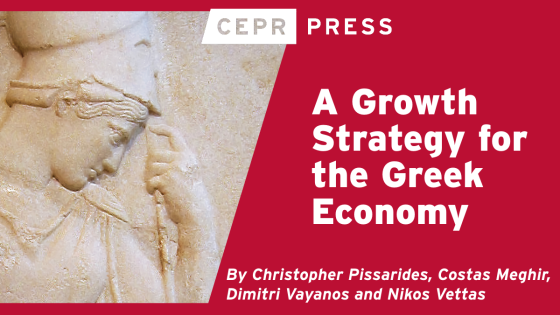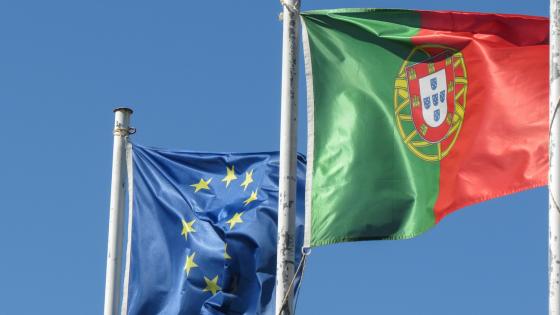The euro crisis is forcing the EU to grow up – fast. With astonishing speed, the Papandreou socialist government has just passed the most stringent fiscal package modern Greece has ever seen:
- Civil servants' salaries are to be cut,
- pensions frozen,
- the VAT raised to 21%.
- Even the politically omnipotent Orthodox Church is supposed to pony up.
- Corruption and tax evasion are on the public agenda.
All of this is supposed to reduce the deficit by 4% of GDP in the coming year – a bare-knuckled discussion of the structural deficit that the Greeks never got around to reducing when they entered the Eurozone in 2002. We economists warned that the euro wasn't a one-way street, and politicians blithely ignored us. Maybe they'll listen this time.
But the Greek "crisis" is likely to have far-reaching and healthy effects on EU governance – and may even bring new attention to bear on unsavoury practices of some international investment banks in European public finance.
Clearly, the Great Recession is responsible for the general deterioration of EU budgets, even in the absence of aggressive stimulus programmes. But it also exposed the precarious and unsustainable situation of Greek, Spanish, and Portuguese fiscal policies, which were not managed well in good times. As financial markets correctly recognised, profligate countries will generally always try to hide behind the fig leaf of an economic downturn to avoid the bitter medicine of fiscal austerity. While generalised EU fiscal contraction in a downturn would be more than counterproductive, a serious Hellenic fiscal correction is necessary and long overdue.
The demonstrations and riots in Athens are an indication of the pain that Greece will face in the coming years. A fiscal contraction in a small open economy under fixed exchange rates (i.e. inside the Eurozone) is likely to hurt in the short run.
These draconian measures are also proof that the Eurozone is forcing the very political integration that economists were demanding as a precondition for monetary union (Persaud 2008).
Political integration occurs when voters and politician in one country of a union have direct say in policies taken in another. This direct interest is usually derived from fiscal concerns as in the current case, and as usual it results from the citizens of one region applying its own standards to others. German taxpayers can hardly be expected to work to age 67 so Greeks can retire at 50 or 55.
Similarly, it is hard to understand how a country can be bankrupt when it owns billons of euros in real assets (including countless islands). Texans or Alaskans are certainly entitled to comment on California's or New York’s fiscal problems when asked to pick up the tab for the federal stimulus package, of which almost a quarter was emergency bailout funding for states. With GDP figures showing the equivalent of a minor recession of the Eurozone, Greece can only expect “tough love” from the EU Commission – and this is the only credible way to nudge the mother of democracy, the cradle of Europe, towards fiscal rectitude. But political integration is also about the rights of Greeks, Spaniards, Italians and Portuguese to complain about, and even influence economic policy in the rest of the Eurozone – meaning essentially France and Germany.
Deeper integration
At the same time, Europeans need to focus their attention on financial market integration, and on the role of investment banks in public finance, and in particular the current crisis. It cannot make sense to allow international investment banks to advise EU member governments on financial matters, organise the issuance of credit default swaps on the same debt they have helped issue, and then bet against that debt via the same CDS via their proprietary trading desks or hedge funds.
We've heard it a million times, but it's worth repeating. Who in their right mind would allow construction companies to build and sell houses, organise (and make money on the brokerage of) underwriting of negotiable fire insurance policies in unlimited amounts on those houses (by possibly uninformed, stupid money), and then trade the very same insurance policies in the market? This is even more absurd if the underwriting institutions are too big to fail - i.e. being stupid with money has no real economic cost because the government cannot credibly refuse to bail them out (like AIG). Common sense points to the danger of moral hazard if not outright malfeasance.
Dogmatic adherence to free market principles can only further degrade our respectability as economists, too often seen as apologists for financial croupiers. Do we really know enough to deny the existence of self-fulfilling prophecies, or that uncovered short sales of debt in thin markets combined with purchases of CDS constitute the equivalent of a money pump? Isn’t it suspicious that, according to the New York Times, Goldman Sachs sold its famous sleight-of-hand interest swap deal with the Greek government to a private Greek bank, already in 2005?
One way to chase away this demon is a deeper level of intra-European financial integration, in particular, a Europe-wide Tobin tax on transactions involving government debt. (I never thought I would write this, but I never thought I'd ever see Great Depression 2.0 either). In the US, not only is state debt and derivatives traded in deeper markets, but there is also no chance that California would ever secede from the union. Europe isn’t quite there yet. A small transaction tax on EU government debt could well suffice to chase away the financial arsonists. In this sense, the EU or Euroarea could further promote stabilisation of its public finances as well as of financial markets. Since most EU government debt is in the hands of European citizens or European banks, this will have negligible effect on the fundamental ability of governments to raise money in capital markets. In fact, EU governments could even give back the revenues to European citizens by cutting painfully high payroll taxes.
The IMF “cop-out”
But back to the Greeks, who still have to get their house in order. Some, like Charles Wyplosz, have advocated bringing in the IMF as neutral broker of stabilisation policies for European governments in trouble. This is indeed the most impressive of commitment devices, but I doubt Europe could stomach giving away real authority on fiscal matters to a third party, especially given the dominant role of the US in that organisation. Besides it would be a cop-out. Europe can’t slough off its important decisions to some faraway place.
If Europe is serious about its political future, it has to take the next step. A European Monetary Fund – with the same type of prudent, independent governance as the European Central Bank – must be the logical next step along the path of political integration.
It's time to grow up, Europe!
References
Prasaud, Avinash (2008), “The financial crisis may hasten European integration but slow global banking”, VoxEU.org, 6 October.
Wyplosz, Charles (2009), “Bailouts: The next step up?”, VoxEU.org, 21 February.


